- Home
- Josephine Tey
The Singing Sands ag-6 Page 3
The Singing Sands ag-6 Read online
Page 3
‘Pink and clean.’
He had an instant picture of Williams, sitting solid and shy at the tea-table in the lounge of the Westmorland. He had been on his way out after a session with the manager and had come across Laura and Grant having tea, and had been persuaded to join them. He had made a great success with Laura.
‘You know, whenever this country is in one of its periodic messes, I think of Sergeant Williams and am quite sure on the instant that everything is going to be all right.’
‘I suppose I don’t reassure you at all,’ Grant said, busy unstrapping luggage.
‘Not noticeably. Not that way, anyway. You’d only be a comfort if everything wasn’t going to be all right.’ With which cryptic statement she left him. ‘Don’t come down until you want to. Don’t come down at all, if it comes to that. Just ring when you waken.’
Her footsteps went away down the passage, and the silence flooded in behind her.
He stripped off his clothes and without bothering to pull a curtain over the light he fell into bed. Presently he thought: I’d better draw those curtains or the light may waken me too soon. He opened his eyes reluctantly, to gauge the degree of light, and found that the light was no longer coming in at the window at all. It was lying on the out-of-doors instead. He lifted his head from the pillow to consider this oddity, and realised that it was late afternoon.
Relaxed and amused, he turned on to his back and lay listening to the quiet. The immemorial quiet. He savoured it, and luxuriated in his long reprieve. Not an enclosed space between this and the Pentland Firth. Between this and the North Pole, if it came to that. Through the wide-open window he could see the evening sky, still grey but faintly luminous and streaked with level cloud. No rain in that sky; only an echo of the peace that held the world in this contented quiet. Oh, well, if he could not fish he could walk. If the worst came to the worst he could shoot rabbits.
He watched the level clouds darken against their background and wondered whom Laura would have got for him to marry this time. It was an extraordinary thing how all married women were banded together against the state of singleness in man. If the women were happily married, like Laura, they considered marriage the only satisfactory state for an adult not suffering from any marked incapacity or relevant hindrance. If they were unhappily yoked, then they were filled with resentment of anyone who had escaped such punishment. Each time that he came to Clune, Laura was in the habit of producing some carefully vetted female for his consideration. Nothing was ever said about their desirable qualities, of course; they were just trotted up and down in front of him so that he might view their paces. Nor, when he showed no particular interest in a candidate, was there any overt regret in the atmosphere; any suggestion of reproof. All that happened was that next time Laura had a new idea.
Somewhere, far away, was a sound that was either the lazy clucking of a hen or the clash of teacups being assembled. He listened for a little, hoping that it was a hen, but decided with regret that it was tea in preparation. He must get up. Pat would be home from school, and Bridget awake from her afternoon nap. It was quite typically Laura that she should not even have demanded from him a due admiration of her daughter; that he had not been asked to exclaim over her growth in the last year, her intelligence, her looks. Bridget had not been mentioned at all. She was merely a young creature somewhere out of sight, like the rest of the farm animals.
He got up and went to have a bath. And twenty minutes later he went downstairs conscious that he was hungry for the first time for months.
The family picture upon which the sitting-room door opened was pure Zoffany, he thought. The sitting-room at Clune occupied almost the whole of what had been the original farmhouse and was now a small wing to the main building. Because it had once been several rooms instead of one it had more windows than are usual in its kind; because it had thick walls it was warm and safe-feeling; and because it had a south-west outlook it was brighter than most. So all the traffic of the house was concentrated there, as in the hall of some medieval manor. Only at luncheon and supper was any other room used by the family. A large round table by the fire ensured the comforts of ‘dining-room’ meals at tea and breakfast, and the rest of the room was a fine free mixture of office, drawing-room, music-room, schoolroom and greenhouse. Johan, Grant thought, would not have had to alter one detail. It was all there already, even to the cadging terrier at the table and Bridget splay-legged on the hearthrug.
Bridget was a blonde, silent child of three who spent her days endlessly rearranging the same few objects into new patterns. ‘I can’t make up my mind whether she is mentally deficient or a genius,’ Laura said. But Grant thought that the two-second glance with which Bridget favoured him on introduction entirely justified the cheerfulness of Laura’s tone; there was nothing wrong with the intelligence of The Child, as Patrick called her. This epithet as used by Pat had no sense of opprobrium; nor even any marked condescension; it merely emphasised his own inclusion in the adult group, to which his six years seniority in his own estimation entitled him.
Pat had red hair, and a bleak and intimidating grey eye. He was wearing a tattered green tartan kilt, smoke-blue stockings, and a much-darned grey jersey. His greeting to Grant was off-hand but reassuringly uncouth. Pat spoke from choice what his mother called ‘clotted Perthshire’, his bosom friend at the village school being the shepherd’s son, who hailed from Killin. He could, of course, when he had a mind, speak faultless English, but it was always a bad sign. When Pat was ‘not speaking’ to you he was always not speaking in the best English.
Over tea, Grant asked him if he had yet made up his mind what he was going to be; Pat’s invariable answer to the question from the age of four having been: ‘A’m taking it into avizandum.’ A phrase borrowed from his J.P. father.
‘Ay,’ said Pat, spreading jam with a liberal hand. ‘A’ve made up muh mind.’
‘You have? That’s fine. What are you going to be?’
‘A revolutionary.’
‘I hope I never have to arrest you.’
‘Yu couldna,’ said Pat simply.
‘Why not?’
‘A’ll be good, man,’ said Pat, dipping the spoon again.
‘I’m sure that’s the sense Queen Victoria used the word in,’ Laura said, removing the jam from her son’s possession.
It was for that sort of thing that he had loved her. The odd glinting detachment that shot the texture of her maternalism.
‘I have a fish for you,’ Pat said, scraping the jam to one side of the slice of bread, so that it would, over at least half the surface, achieve the required depth. (What he actually said was: ‘Ah hiv a fush forrya,’ but Pat’s phonetics are no pleasanter to the eye than they are on the ear, and may be left to the imagination.) ‘Under the ledge in the Cuddy Pool. You can have a len’ of my fly, if you like.’
Since Pat possessed a large tin box full of assorted invitations to slaughter, ‘my fly’ in the singular could only mean ‘the fly I have invented’.
‘What is Pat’s lure like?’ he asked when Pat had taken himself off.
‘Actionable, I should say,’ said his mother. ‘A fearsome object.’
‘Does he catch anything with it?’
‘Oddly enough, yes,’ Tommy said. ‘I suppose there are suckers in the fish world just the same as in any other.’
‘The poor things just gape with astonishment at sight of it,’ Laura said, ‘and before they have time to shut their mouths the current has swept it in. Tomorrow’s Saturday, so you can see it in operation. But I don’t think that anything, even Pat’s unholy creation, will lure that six-pounder in the Cuddy Pool to the surface with the water the way it is just now.’
And of course Laura was right. Saturday morning was bright and rainless and the six-pounder in the Cuddy Pool was far too dismayed by his imprisonment, far too obsessed with his desire to go higher up the river, to be interested in surface distractions. So it was suggested that Grant should go trout fishing in the loch
, with Pat as gillie. The loch was two miles away in the hills, a flat pool on a bleak bit of moor. When it was windy on Lochan Dhu the gale took your line out of the water at right angles and held it stiff as a telephone wire. When it was calm the midges made a meal of you while the trout came to the surface and openly laughed. But if trout fishing was not Grant’s idea of the perfect occupation, being gillie was obviously Patrick’s idea of heaven. There was nothing, from riding the black bull down at Dalmore to demanding threepence-worth of sweets from Mrs Mair at the post-office with the aid of a ha’penny and menaces, that Pat was not capable of. But the joy of messing about in a boat was still something that he could not provide for himself. The boat at the loch was padlocked.
So Grant set off up the sandy path through the dry heather, with Pat at his side and one pace in the rear like a gun dog on its best behaviour. And as he went he was conscious of his own reluctance and wondered at it.
Why should there be any qualification in his pleasure this morning, in his delight in going fishing? Brown trout might not be his idea of a sporting contest, but he was glad enough to be spending the day with a rod in his hand even if he caught nothing whatever. He was supremely glad to be out in the open, alive and at leisure, with the familiar spring of peaty turf under his feet, and the hills before him. Why the small unwillingness at the back of his mind? Why, instead of taking a boat out for the day on Lochan Dhu, did he want to hang round the farm?
They had walked for a mile before he had flushed the reason from the cover of his subconscious. He had wanted to stay at Clune today so that he could see the daily paper when it arrived.
He had wanted to find out about B Seven.
His conscious mind had dropped B Seven behind, with the tribulations of the journey and the memory of his humiliation. He had not consciously remembered him from the moment when he fell into bed on arrival until now, nearly twenty-four hours later. But B Seven was still with him, it would seem.
‘When does the daily paper arrive at Clune these days?’ he asked Pat, still silent and on his best behaviour one pace in the rear.
‘If it’s Johnny it comes at twelve, but if it’s Kenny it’s often near one before it comes.’ And Pat added, as if glad to have conversation introduced into the expeditionary routine, ‘Kenny stops to have a cup at Dalmore, east the road. He’s gone on the MacFadyean’s Kirsty.’
A world where the news of the nations’ clamour waited while Kenny had a cup from the MacFadyean’s Kirsty was a very pleasant one, Grant thought. In the days before radio it must have bordered on Paradise.
‘That guard the way to Paradise.’
The singing sands.
The beasts that talk,
The streams that stand,
The stones that walk,
The singing sand…
What had it stood for? Was it just a country of the mind?
Out here in the open, in this elemental land, it had an appropriateness that somehow lessened its strangeness. It was quite possible to believe this morning that there were places on this earth where stones might walk. Were there not places, known places, even in the Highlands where a man alone in the bright sunlight of a summer day could be invaded by the knowledge of unseen watchers, so that he was filled with a great fear and ran panic-stricken from the place? Yes, and without any previous interviews in Wimpole Street, either. In the ‘old’ places anything was possible. Even beasts that talked.
Where had B Seven got his idea of strangeness?
They launched the light boat from its wooden runway, and Grant pulled out into the loch and made for the windward end. It was much too bright, but there was a breath of air that might lift to a breeze strong enough to put a ripple on the surface. He watched Pat put his rod together and bend a fly on the line, and thought that if he could not have the felicity of possessing a son then a small red-headed cousin made a very good substitute.
‘Did you ever present a bouquet, Alan?’ asked Pat, busy with the fly. He called it ‘a bookey’.
‘Not that I can remember,’ Grant said carefully. ‘Why?’
‘They’re at me to present a bookey to a Viscountess that’s coming to open the Dalmore hall.’
‘Hall?’
‘That shed place at the cross-roads,’ Pat said bitterly. He was silent a moment, evidently mulling it over. ‘It’s an awful jessie-like thing to present a bookey.’
Grant, bound in duty to the absent Laura, searched his mind. ‘It’s a great honour,’ he said.
‘Then let The Child have the honour.’
‘She is a little young yet for such responsibility.’
‘Well, if she’s too young for such responsibility I’m too old for such capers. So they’ll have to get some other family to do it. It’s all havers anyway. The hall’s been open for months.’
To this disillusioned contempt for adult pretence Grant had no answer.
They fished turn-about, in a fine male amity; Grant flicking his line with a lazy indifference, Pat with the incurable optimism of his kind. By noon they had drifted back to a point level with the little jetty, and they turned in-shore to make tea on the primus in the little bothy. As Grant was paddling the last few yards he saw Pat’s eye fixed on something along the shore, and turned to see what occasioned such marked distaste. Having looked at the advancing figure with its shoggly body and inappropriate magnificence, he asked who that might be.
‘That’s Wee Archie,’ said Pat.
Wee Archie was wielding a shepherd’s crook that, as Tommy remarked later, no shepherd would be found dead with, and he was wearing a kilt that no Highlander would dream of being found alive in. The crook stood nearly two feet above his head; and the kilt hung down at the back from his non-existent hips like a draggled petticoat. But it was obvious that the wearer was conscious of no lack. The tartan of his sad little skirt screamed like a peacock, raucous and alien against the moor. His small dark eel’s head was crowned by a pale blue Balmoral with a diced band, the bonnet being pulled down sideways at such a dashing angle that the slack covered his right ear. On the upper side a large piece of vegetation sprouted from the crest on the band. The socks on the hairpin legs were a brilliant blue, and so hairy in texture that they gave the effect of some unfortunate growth. Round the meagre ankles the thongs of the brogues were cross-gartered with a verve that even Malvolio had never achieved.
‘What is he doing round here?’ Grant asked, fascinated.
‘He lives at the inn at Moymore.’
‘Oh. What does he do?’
‘He’s a revolutionary.’
‘Really? Is that the same revolution as yours?’
‘Nah!’ said Pat in great scorn. ‘Oh, I’m not saying maybe he didn’t put the idea in my head. But no one would take heed of the likes of him. He writes pomes.’
‘I take it that he is a once-born.’
‘Him! He’s not born at all, man. He’s a—a—a egg.’
Grant concluded that the word Pat had sought was amoeba, but that knowledge had not reached so far. The lowest form of life he knew of was the egg.
The ‘egg’ came blithely towards them along the stony beach, swinging the tail of his deplorable petticoat with a fine swagger that went ill with his hirpling movement over the stones. Grant was suddenly convinced that he had corns. Corns on thin pink feet that sweated easily. The kind of feet people were always writing to medical columns in the Press about. (Wash every evening without fail and dry thoroughly, especially between the toes. Dust well with talcum powder and put on fresh socks each morning.)
‘Cia mar tha si?’ he called as he came within hailing distance.
Was it just chance, Grant wondered, that all cranky people had that thin bodyless voice? Or was it that thin bodyless voices belonged to the failures and the frustrated and that frustration and failure bred the desire to repudiate the herd?
He had not heard that Gaelic phrase since he was a child, and the affectation of it cooled his welcome. He bade the man good-morning.
‘Patrick should have told you that it was too bright to fish today,’ he said, swinging up to them. Grant did not know which displeased him more: the vile Glasgow speech or the unwarranted patronage.
The freckles on Pat’s fair skin were lost in a red tide. Speech trembled on his lips.
‘I expect he didn’t want to do me out of my pleasure,’ Grant said smoothly; and watched the tide recede and a slow appreciation dawn. Pat had discovered that there were more effective ways of dealing with folly than direct attack. It was a quite new idea and he was trying the taste of it, rolling it on his tongue.
‘You’ve come ashore for your elevenses, I take it,’ Wee Archie said brightly. ‘I’ll be glad to join you if you’ve no objection.’
So they made tea for Wee Archie, glum and polite. He produced his own sandwiches, and while they ate he lectured them on the glory of Scotland; its mighty past and dazzling future. He had not asked Grant’s name and was betrayed by his speech into taking him for an Englishman. Surprised, Grant heard of England’s iniquities to a captive and helpless Scotland. (Anything less captive or less helpless than the Scotland he had known would be difficult to imagine.) England, it seemed, was a blood-sucker, a vampire, draining the good blood of Scotland and leaving her limp and white. Scotland had groaned under the foreign yoke, she had come staggering behind the conqueror’s chariot, she had paid tribute and prostituted her talents to the tyrant’s needs. But she was about to throw off the yoke, to unloose the bands; the fiery cross was about to be sent out once more, and soon the heather would be alight. There was no cliché that Wee Archie spared them.
Grant watched him with the interest one accords to a new exhibit in a collection. He decided that the man was older than he had thought. Forty-five at least; probably nearer fifty. Too old to be curable. Whatever success he had coveted had passed him by; there would never be anything for him but his pitiable fancy-dress and his clichés.

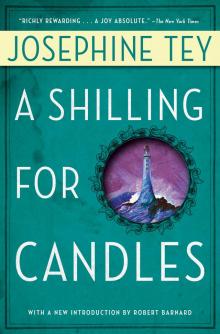 A Shilling for Candles
A Shilling for Candles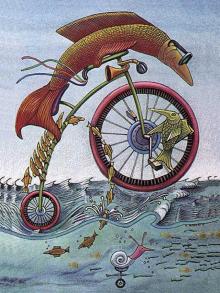 The Singing Sands
The Singing Sands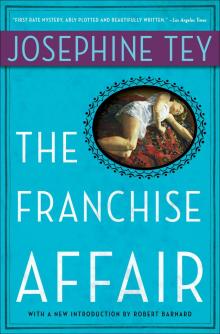 The Franchise Affair
The Franchise Affair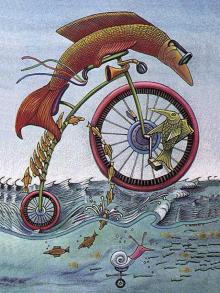 Daughter of Time
Daughter of Time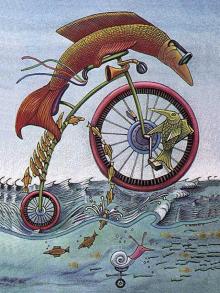 To Love and Be Wise
To Love and Be Wise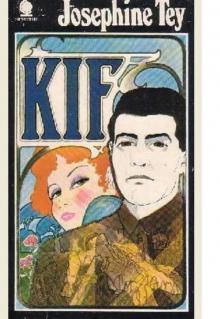 Kif
Kif The Expensive Halo: A Fable Without Moral
The Expensive Halo: A Fable Without Moral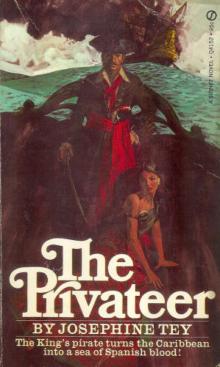 The Privateer
The Privateer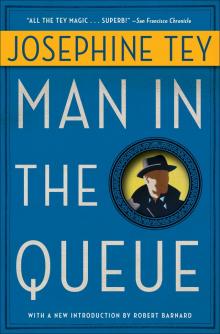 The Man in the Queue
The Man in the Queue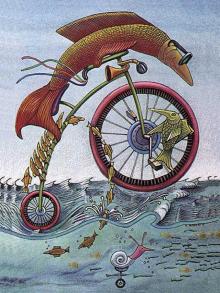 Miss Pym Disposes
Miss Pym Disposes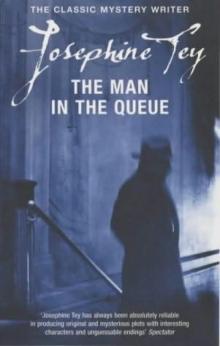 The Man in the Queue ag-1
The Man in the Queue ag-1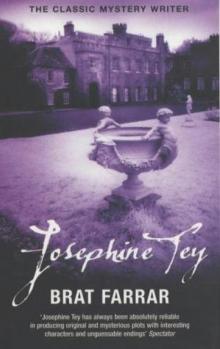 Brat Farrar
Brat Farrar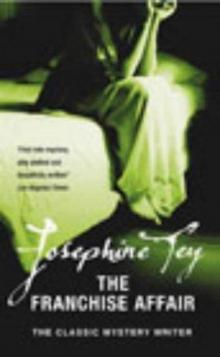 The Franchise Affair ag-3
The Franchise Affair ag-3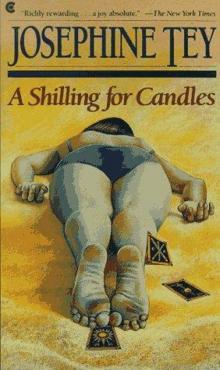 A Shilling for Candles ag-2
A Shilling for Candles ag-2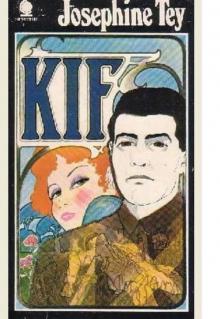 Kif: An Unvarnished History
Kif: An Unvarnished History The Expensive Halo
The Expensive Halo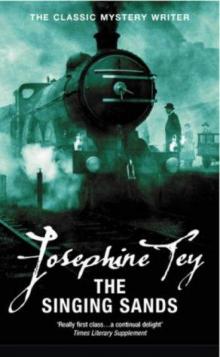 The Singing Sands ag-6
The Singing Sands ag-6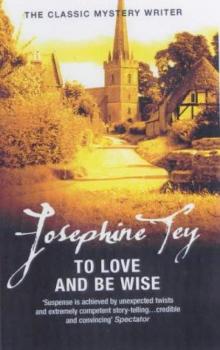 To Love and Be Wise ag-4
To Love and Be Wise ag-4